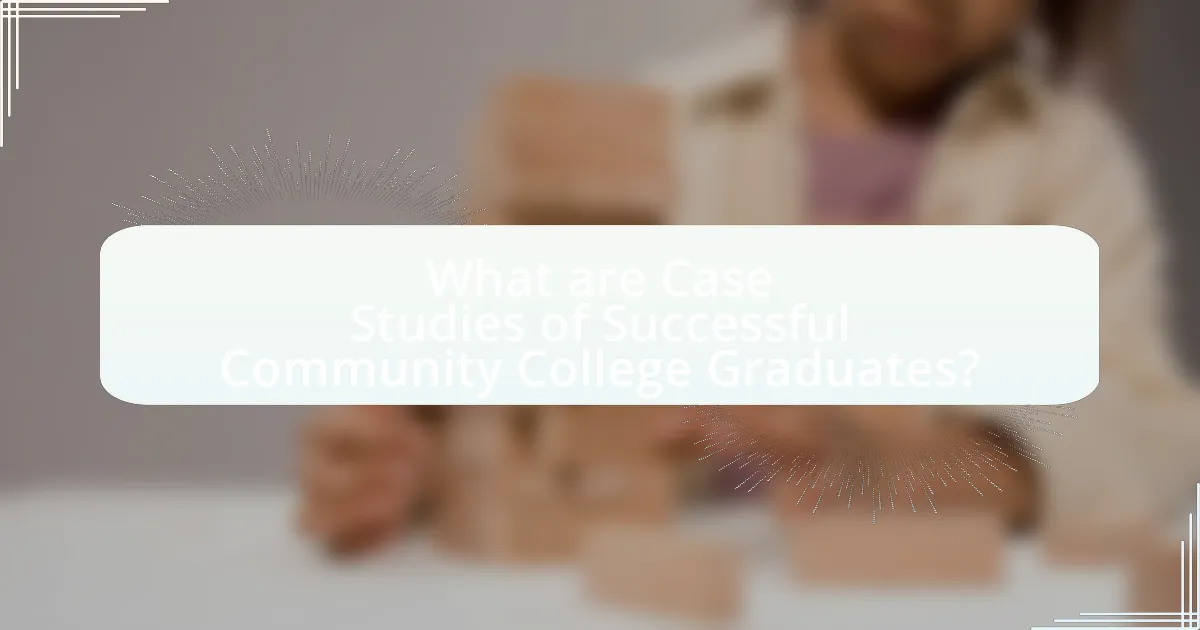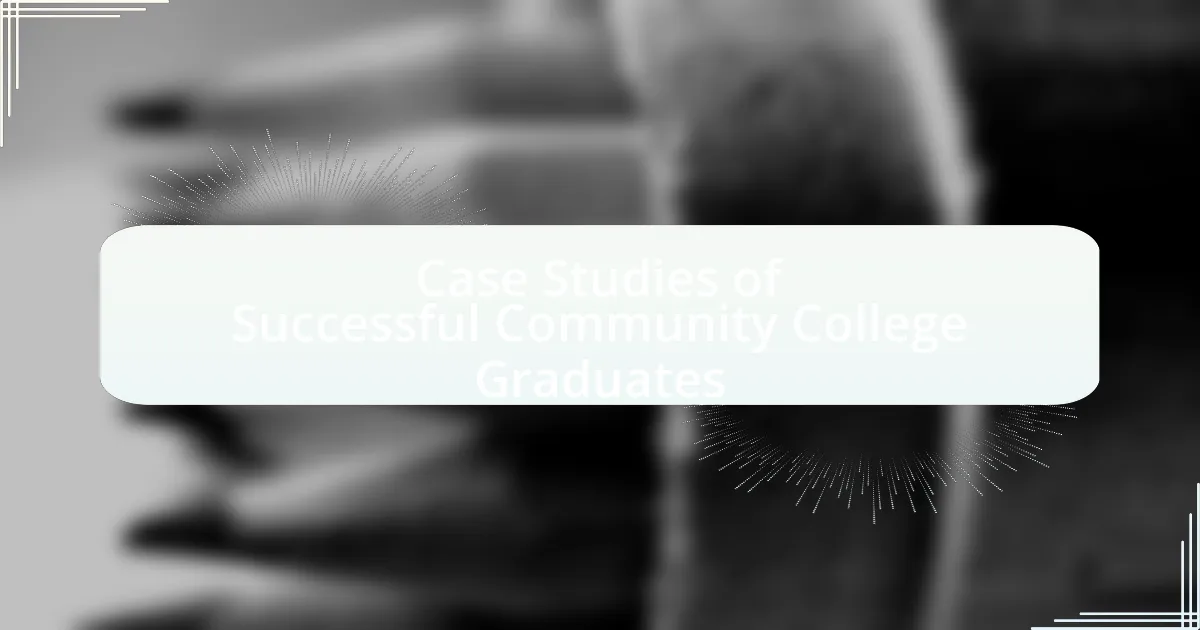The article focuses on case studies of successful community college graduates, highlighting their educational journeys and career advancements. It examines how these individuals leveraged their community college education to overcome challenges, such as financial constraints and limited academic support, while emphasizing the role of mentorship, networking, and available resources in their success. Key factors contributing to their achievements include strong academic performance, engagement in extracurricular activities, and the influence of personal backgrounds. The article also discusses the impact of these success stories on perceptions of community colleges and identifies best practices that can enhance student outcomes.

What are Case Studies of Successful Community College Graduates?
Case studies of successful community college graduates include individuals who have leveraged their education to achieve significant career advancements. For example, a graduate from Santa Monica College, who earned an associate degree in business administration, went on to secure a managerial position at a Fortune 500 company, demonstrating the potential for upward mobility through community college education. Another case is a graduate from Miami Dade College, who transitioned from an associate degree in nursing to becoming a registered nurse and later pursued a master’s degree, illustrating the pathway from community college to advanced professional roles. These examples highlight the effectiveness of community colleges in providing accessible education that leads to successful career outcomes.
How do these case studies illustrate the journeys of graduates?
These case studies illustrate the journeys of graduates by showcasing their diverse paths from enrollment to successful careers. Each case study highlights individual experiences, challenges faced, and the support systems utilized, demonstrating how community colleges facilitate personal and professional growth. For instance, one graduate may have overcome financial hardships through scholarships, while another leveraged mentorship programs to secure internships, ultimately leading to job placements in their desired fields. These narratives provide concrete examples of how community colleges empower graduates to achieve their goals, reflecting the broader impact of educational support on career trajectories.
What common challenges do these graduates face during their education?
Graduates from community colleges commonly face challenges such as financial constraints, balancing work and study, and limited academic support. Financial constraints often lead to stress, as many students juggle tuition fees, living expenses, and part-time jobs. Balancing work and study is another significant challenge, with many graduates working to support themselves while managing their coursework, which can lead to time management issues. Limited academic support can hinder their educational experience, as some students may not have access to adequate resources like tutoring or mentoring, impacting their academic performance. These challenges are well-documented in studies highlighting the experiences of community college students, emphasizing the need for targeted support systems to enhance their educational outcomes.
How do personal backgrounds influence their success stories?
Personal backgrounds significantly influence success stories by shaping individuals’ motivations, opportunities, and resilience. For instance, graduates from diverse socioeconomic backgrounds often face unique challenges that can either hinder or propel their academic and career achievements. Research indicates that students from lower-income families may develop stronger work ethics and determination due to overcoming financial hardships, which can lead to greater success in community college settings. Additionally, personal experiences, such as cultural heritage or family support, can provide essential networks and resources that enhance educational outcomes. Studies show that community college graduates who leverage their backgrounds, such as first-generation college students, often exhibit higher levels of perseverance and adaptability, contributing to their overall success.
What key factors contribute to the success of these graduates?
Key factors contributing to the success of community college graduates include strong academic support, effective mentorship, and engagement in extracurricular activities. Research indicates that students who utilize academic resources, such as tutoring and advising, are more likely to achieve higher grades and complete their programs. Additionally, mentorship from faculty or industry professionals provides guidance and networking opportunities, which are crucial for career advancement. Engagement in extracurricular activities fosters a sense of community and belonging, enhancing motivation and retention rates among students. These elements collectively create an environment that promotes academic and professional success for graduates.
How do community college resources support student achievement?
Community college resources support student achievement by providing academic advising, tutoring services, financial aid, and career counseling. These resources enhance students’ educational experiences and help them navigate challenges. For instance, a study by the American Association of Community Colleges found that students who utilized academic support services had a 10% higher retention rate compared to those who did not. Additionally, financial aid programs alleviate economic barriers, enabling students to focus on their studies rather than financial stress. Career counseling services also connect students with job opportunities, further motivating them to complete their degrees.
What role do mentorship and networking play in their success?
Mentorship and networking are crucial for the success of community college graduates, as they provide guidance, support, and opportunities for professional growth. Mentorship offers personalized advice and insights from experienced individuals, helping graduates navigate their career paths effectively. Networking facilitates connections with industry professionals, leading to job opportunities and collaborations. Research indicates that 70% of people find jobs through networking, highlighting its importance in career advancement. Additionally, studies show that mentees are more likely to secure promotions and higher salaries, underscoring the significant impact of mentorship on long-term success.

What insights can we gain from analyzing these case studies?
Analyzing case studies of successful community college graduates reveals key insights into educational pathways and outcomes. These insights include the importance of targeted support services, such as academic advising and tutoring, which significantly enhance student retention and success rates. For instance, a study by the Community College Research Center found that students who engaged with support services were 10% more likely to complete their degrees compared to those who did not. Additionally, the case studies highlight the role of community engagement and networking opportunities in fostering career readiness, as graduates often attribute their job placements to connections made during their college experience. This evidence underscores the value of holistic educational approaches that integrate academic and career support for community college students.
How do these success stories impact perceptions of community colleges?
Success stories significantly enhance perceptions of community colleges by showcasing their effectiveness in transforming lives and providing pathways to success. These narratives illustrate the tangible outcomes of community college education, such as increased employment opportunities and higher earning potential for graduates. For instance, a study by the American Association of Community Colleges found that community college graduates earn, on average, $10,000 more annually than those without a degree. This data reinforces the idea that community colleges are valuable institutions that contribute positively to individual and community economic growth, thereby improving their overall reputation.
What lessons can be learned about effective educational practices?
Effective educational practices emphasize the importance of personalized learning, active engagement, and support systems. Research indicates that tailoring educational experiences to individual student needs enhances retention and success rates. For instance, a study by the Community College Research Center found that community colleges implementing personalized advising and mentorship programs saw a 10% increase in graduation rates. Additionally, active learning strategies, such as collaborative projects and hands-on activities, have been shown to improve student engagement and comprehension, leading to better academic outcomes. These practices collectively contribute to a more effective educational environment that fosters student achievement.
How do these graduates contribute to their communities post-graduation?
Graduates contribute to their communities post-graduation by engaging in local service projects, mentoring youth, and participating in civic activities. For instance, many graduates volunteer with organizations that address community needs, such as food banks or educational programs, thereby enhancing social support systems. Additionally, graduates often take on leadership roles in local government or non-profits, which allows them to influence policy and drive community development initiatives. Research indicates that community college graduates are more likely to remain in their local areas and invest in their communities, fostering economic growth and social cohesion.
What trends can be identified among successful community college graduates?
Successful community college graduates often exhibit trends such as strong academic performance, engagement in extracurricular activities, and a clear pathway to further education or employment. Research indicates that these graduates typically maintain a GPA of 3.0 or higher, which correlates with higher transfer rates to four-year institutions. Additionally, involvement in student organizations and networking opportunities enhances their skills and job readiness, leading to increased employment rates post-graduation. A study by the American Association of Community Colleges found that 70% of community college graduates who participated in internships secured jobs within six months of graduation, highlighting the importance of practical experience in their success.
Which fields of study lead to the most successful outcomes?
Fields of study that lead to the most successful outcomes include healthcare, engineering, and information technology. Graduates in healthcare fields, such as nursing, often experience high job placement rates and competitive salaries due to the ongoing demand for medical professionals. For instance, the U.S. Bureau of Labor Statistics projects a 7% growth in nursing jobs from 2019 to 2029, indicating strong career prospects. Engineering disciplines, particularly electrical and civil engineering, also yield successful outcomes, with median salaries exceeding $80,000 annually and a projected job growth of 3% to 5% in the coming years. Information technology fields, including computer science and cybersecurity, are similarly lucrative, with a projected growth rate of 11% for computer and information technology occupations from 2019 to 2029, reflecting the increasing reliance on technology across industries.
How do demographic factors influence success rates?
Demographic factors significantly influence success rates in community college graduates. Research indicates that variables such as age, socioeconomic status, ethnicity, and educational background impact students’ likelihood of completing their programs. For instance, a study by the National Center for Education Statistics found that younger students, particularly those from higher socioeconomic backgrounds, tend to have higher graduation rates compared to older students or those from lower-income families. Additionally, ethnic minorities often face systemic barriers that can hinder their academic success, as highlighted in the report “The Condition of Education 2021.” This report shows that while enrollment rates for minority students have increased, their completion rates still lag behind those of their white counterparts, illustrating the complex interplay between demographic factors and educational outcomes.

How can aspiring community college students leverage these case studies?
Aspiring community college students can leverage case studies of successful graduates by analyzing the strategies and pathways these individuals used to achieve their goals. By studying specific examples, students can identify effective academic practices, networking opportunities, and career choices that led to success. For instance, case studies often highlight the importance of mentorship, involvement in campus organizations, and internships, which can provide practical insights for students to emulate. Additionally, understanding the challenges faced by these graduates and how they overcame them can equip aspiring students with resilience and problem-solving skills necessary for their own educational journeys.
What strategies can students adopt to enhance their chances of success?
Students can enhance their chances of success by actively engaging in effective time management, seeking academic support, and participating in extracurricular activities. Effective time management allows students to prioritize tasks and allocate sufficient time for studying, which is crucial for academic performance. Research indicates that students who utilize planners or digital tools to organize their schedules tend to achieve higher grades. Seeking academic support, such as tutoring or mentoring, provides students with additional resources to understand course material better, leading to improved outcomes. Furthermore, participation in extracurricular activities fosters a sense of community and develops essential skills like teamwork and leadership, which are beneficial for both personal and professional growth. Studies show that students involved in such activities are more likely to persist in their studies and graduate.
How can students effectively utilize available resources and support systems?
Students can effectively utilize available resources and support systems by actively engaging with academic advisors, utilizing tutoring services, and participating in study groups. Engaging with academic advisors helps students create tailored educational plans, ensuring they meet their academic goals. Utilizing tutoring services provides additional academic support, which has been shown to improve student performance; for instance, a study by the National Center for Education Statistics found that students who used tutoring services had higher GPAs than those who did not. Participating in study groups fosters collaboration and enhances understanding of course material, as peer interactions can clarify complex concepts and improve retention. By leveraging these resources, students can enhance their academic success and overall college experience.
What mindset shifts are necessary for overcoming obstacles?
To overcome obstacles, individuals must shift from a fixed mindset to a growth mindset. A growth mindset encourages the belief that abilities and intelligence can be developed through dedication and hard work, which fosters resilience in the face of challenges. Research by Carol Dweck, a psychologist at Stanford University, demonstrates that individuals with a growth mindset are more likely to embrace challenges, persist through difficulties, and learn from criticism, ultimately leading to greater success. This mindset shift is crucial for community college graduates, as it empowers them to view setbacks as opportunities for learning and growth, enhancing their ability to navigate obstacles effectively.
What best practices can be derived from these success stories?
Best practices derived from success stories of community college graduates include establishing strong mentorship programs, fostering community partnerships, and implementing tailored academic support services. Mentorship programs have been shown to enhance student retention and success rates, as evidenced by a study from the Community College Research Center, which found that students with mentors are more likely to complete their degrees. Community partnerships provide students with real-world experience and job opportunities, contributing to higher employment rates post-graduation. Tailored academic support services, such as tutoring and counseling, address individual student needs, leading to improved academic performance and graduation rates. These practices collectively create an environment conducive to student success and achievement.
How can goal-setting and planning improve student outcomes?
Goal-setting and planning can significantly improve student outcomes by providing clear objectives and structured pathways to achieve academic success. When students set specific, measurable, achievable, relevant, and time-bound (SMART) goals, they enhance their focus and motivation, leading to better academic performance. Research indicates that students who engage in goal-setting are more likely to persist in their studies and achieve higher grades, as evidenced by a study published in the Journal of Educational Psychology, which found that goal-setting interventions led to a 20% increase in student performance metrics. Additionally, effective planning allows students to allocate their time and resources efficiently, reducing stress and increasing their ability to meet deadlines. This structured approach not only fosters a sense of accountability but also equips students with essential skills for future success in both academic and professional settings.
What role does resilience play in achieving educational goals?
Resilience is crucial in achieving educational goals as it enables individuals to overcome challenges and setbacks during their academic journey. Students who exhibit resilience are more likely to persist in their studies despite obstacles such as financial difficulties, personal issues, or academic struggles. Research indicates that resilient students demonstrate higher levels of motivation and engagement, which are essential for success in educational settings. For instance, a study published in the Journal of Educational Psychology found that resilience positively correlates with academic performance, highlighting that students with strong coping strategies are better equipped to handle stress and maintain focus on their educational objectives.

Leave a Reply